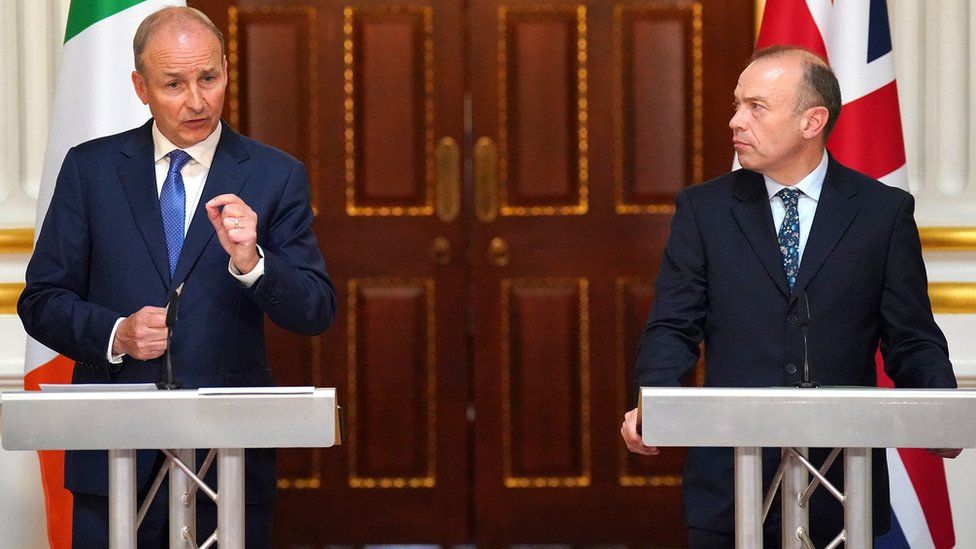In London, talks commenced after ministers from both administrations convened for the British Irish Intergovernmental Conference on Monday.
Among the key topics at hand were issues surrounding the NI Legacy Act.
Representatives from the UK government and Northern Ireland included NI Secretary Chris Heaton-Harris and Lord Caine, while Mr. Martin was set to be joined by Irish Justice Minister Helen McEntee. However, Ms. McEntee withdrew from the conference following the postponement of her meeting with UK Home Secretary James Cleverly, scheduled for Monday night.
The scheduled discussion between Ms. McEntee and Mr. Cleverly aimed to address migration concerns, particularly regarding the influx of asylum seekers from Northern Ireland into the Republic.
Established by the Good Friday Agreement, the British Irish Intergovernmental Conference (BIIGC) aims to foster bilateral cooperation between the UK and Irish governments on matters of mutual interest.
Monday’s meeting marked the first BIIGC since the restoration of power-sharing at Stormont earlier this year. Ministers hailed the reinstatement of the Northern Ireland Executive, Assembly, and North-South Ministerial Council during the discussions.
Security matters, including the recent reduction of the threat level in Northern Ireland to ‘substantial’ in March, were also deliberated.
A major point of contention was the UK’s legacy law, which the Irish government has vehemently opposed. The impending closure of inquests into Troubles-related killings not concluded by Wednesday raised concerns, prompting the Irish government to challenge the UK at the European Court of Human Rights in Strasbourg.
Mr. Martin emphasized the importance of full cooperation with the forthcoming Omagh Inquiry chaired by Lord Turnbull, stressing the need to honor the victims.
Legacy cases, notably the Dublin and Monaghan bombings, were also discussed, alongside the implementation of the Legacy and Reconciliation Act passed at Westminster last year. The act aims to provide closure by establishing the Independent Commission for Reconciliation and Information Recovery (ICRIR) to assist families in uncovering the truth about their loved ones’ deaths or injuries.
Lord Caine, involved in amending the Legacy Act, rejected any notion of a cover-up, affirming the ICRIR’s access to extensive state records.
However, immigration overshadowed discussions, with the Irish government expressing concerns about asylum seekers from Northern Ireland fearing deportation to Rwanda. Plans are underway to legislate for a decision by the Irish High Court, which found the UK ineligible as a “safe third country” due to the threat of deportation to Rwanda.
Despite tensions over immigration, both governments affirmed their commitment to mutual cooperation and stressed the importance of reciprocal agreements.
Downing Street clarified that the UK would not accept asylum seekers crossing into Ireland until EU-wide asylum rules change.
Mr. Heaton-Harris reassured that the UK was committed to maintaining strong relations with Ireland, even amid political differences. He expressed comfort with the legislation regarding Rwanda, believing it reflected previous agreements.
